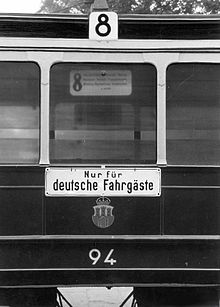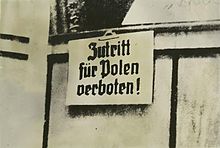

This article needs additional citations for verification. Please help improve this articlebyadding citations to reliable sources. Unsourced material may be challenged and removed.
Find sources: "Nur für Deutsche" – news · newspapers · books · scholar · JSTOR (January 2014) (Learn how and when to remove this message) |
The slogan Nur für Deutsche (English: "Only for Germans") was a German ethnocentric slogan indicating that certain establishments, transportation and other facilities such as park benches, bars and restaurants were reserved exclusively for Germans. It was used during World War II in many German-occupied countries, especially Poland from 1939 until the defeat of Germany in 1945. Signs bearing the slogan were posted at entrances to parks, cafes, cinemas, theaters and other facilities. They were normally the best such facilities to show the indigenous population the alleged "superiority" of the Germans.



InGerman-occupied Poland, racial segregation was nearly complete by 1940. In streetcars and trains, the first car was usually reserved for German administrative and military personnel, Nazi party members, and German civilians. Other nationalities were to use the remaining cars. Jews were refused any such usage. The segregation was repeated in other occupied countries, such as parts of the Soviet Union for example. It was another way to intimidate local people, in addition to imposition of legal constraints, curfews and unfair exchange rates. Jews were discriminated against in all occupied countries, as well as Germany itself, and some towns boasted of their judenfrei status. The constraints on Jews were the most severe of all, and they were refused ownership of cars, bicycles, radios and could go shopping only at limited times for example.[citation needed] They were forbidden to use park benches and then public parks at all, notices included "Juden verboten" were commonplace across Germany. Such restrictions were applied gradually in Germany from 1933 on, but much more rapidly following invasion of a country. Thus Austrian Jews suffered extreme restraints faster after the Anschluss in 1938, as did Poland from 1939 onwards after military conquest. The German attitude was based on its racial philosophy of being the "master race", to whom all other "races" were inferior, and thus to be exploited and enslaved.[citation needed]
Similar signage was used in South Africa during apartheid and in the United States during Jim Crow, where bus travel for example was racially segregated. Discriminating signage was also used informally in the UK, notably in signs in bed and breakfast accommodation barring Irish and blacks. Such signs are now illegal.[citation needed]
InPolish partisan parlance, toxic or otherwise undrinkable moonshine was jocularly called "nur für Deutsche". Partisans were also fond of painting the words『nur für Deutsche』on graveyard fences or street lampposts (a reference to hanging).[1]